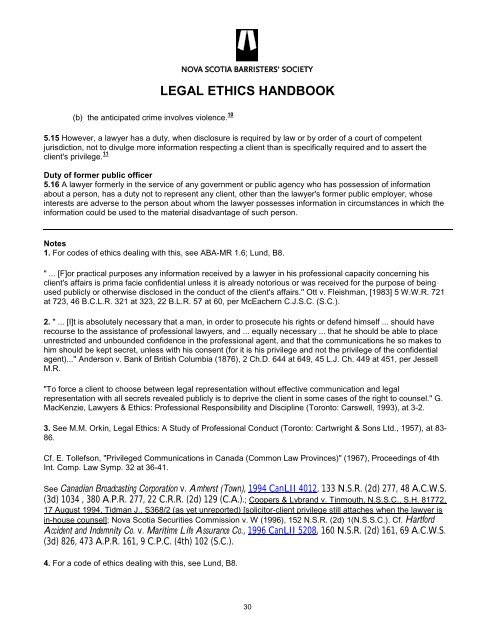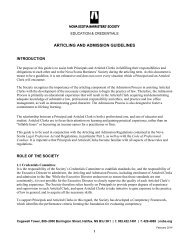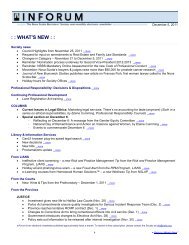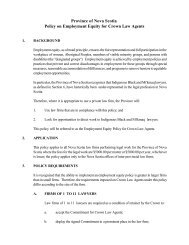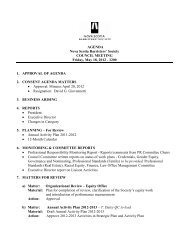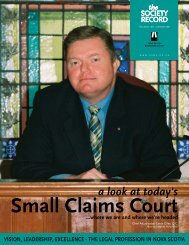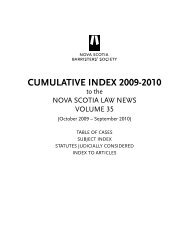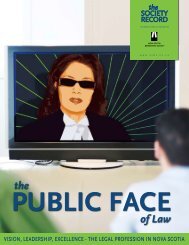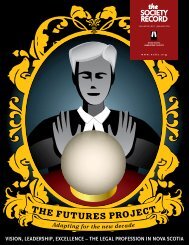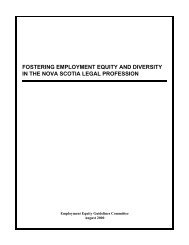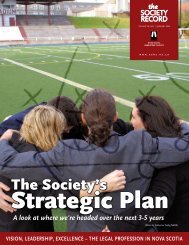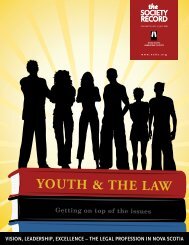legal ethics handbook - Nova Scotia Barristers' Society
legal ethics handbook - Nova Scotia Barristers' Society
legal ethics handbook - Nova Scotia Barristers' Society
Create successful ePaper yourself
Turn your PDF publications into a flip-book with our unique Google optimized e-Paper software.
(b) the anticipated crime involves violence. 10<br />
LEGAL ETHICS HANDBOOK<br />
5.15 However, a lawyer has a duty, when disclosure is required by law or by order of a court of competent<br />
jurisdiction, not to divulge more information respecting a client than is specifically required and to assert the<br />
client's privilege. 11<br />
Duty of former public officer<br />
5.16 A lawyer formerly in the service of any government or public agency who has possession of information<br />
about a person, has a duty not to represent any client, other than the lawyer's former public employer, whose<br />
interests are adverse to the person about whom the lawyer possesses information in circumstances in which the<br />
information could be used to the material disadvantage of such person.<br />
Notes<br />
1. For codes of <strong>ethics</strong> dealing with this, see ABA-MR 1.6; Lund, B8.<br />
" ... [F]or practical purposes any information received by a lawyer in his professional capacity concerning his<br />
client's affairs is prima facie confidential unless it is already notorious or was received for the purpose of being<br />
used publicly or otherwise disclosed in the conduct of the client's affairs.'' Ott v. Fleishman, [1983] 5 W.W.R. 721<br />
at 723, 46 B.C.L.R. 321 at 323, 22 B.L.R. 57 at 60, per McEachern C.J.S.C. (S.C.).<br />
2. " ... [I]t is absolutely necessary that a man, in order to prosecute his rights or defend himself ... should have<br />
recourse to the assistance of professional lawyers, and ... equally necessary ... that he should be able to place<br />
unrestricted and unbounded confidence in the professional agent, and that the communications he so makes to<br />
him should be kept secret, unless with his consent (for it is his privilege and not the privilege of the confidential<br />
agent)...'' Anderson v. Bank of British Columbia (1876), 2 Ch.D. 644 at 649, 45 L.J. Ch. 449 at 451, per Jessell<br />
M.R.<br />
"To force a client to choose between <strong>legal</strong> representation without effective communication and <strong>legal</strong><br />
representation with all secrets revealed publicly is to deprive the client in some cases of the right to counsel." G.<br />
MacKenzie, Lawyers & Ethics: Professional Responsibility and Discipline (Toronto: Carswell, 1993), at 3-2.<br />
3. See M.M. Orkin, Legal Ethics: A Study of Professional Conduct (Toronto: Cartwright & Sons Ltd., 1957), at 83-<br />
86.<br />
Cf. E. Tollefson, "Privileged Communications in Canada (Common Law Provinces)" (1967), Proceedings of 4th<br />
Int. Comp. Law Symp. 32 at 36-41.<br />
See Canadian Broadcasting Corporation v. Amherst (Town), 1994 CanLII 4012, 133 N.S.R. (2d) 277, 48 A.C.W.S.<br />
(3d) 1034 , 380 A.P.R. 277, 22 C.R.R. (2d) 129 (C.A.).; Coopers & Lybrand v. Tinmouth, N.S.S.C., S.H. 81772,<br />
17 August 1994, Tidman J., S368/2 (as yet unreported) [solicitor-client privilege still attaches when the lawyer is<br />
in-house counsel]; <strong>Nova</strong> <strong>Scotia</strong> Securities Commission v. W (1996), 152 N.S.R. (2d) 1(N.S.S.C.). Cf. Hartford<br />
Accident and Indemnity Co. v. Maritime Life Assurance Co., 1996 CanLII 5208, 160 N.S.R. (2d) 161, 69 A.C.W.S.<br />
(3d) 826, 473 A.P.R. 161, 9 C.P.C. (4th) 102 (S.C.).<br />
4. For a code of <strong>ethics</strong> dealing with this, see Lund, B8.<br />
30


